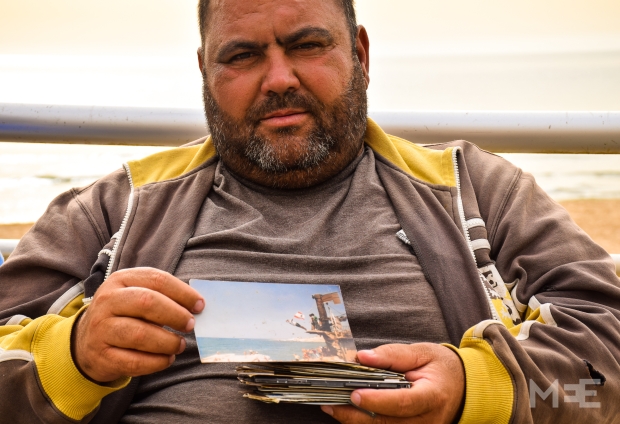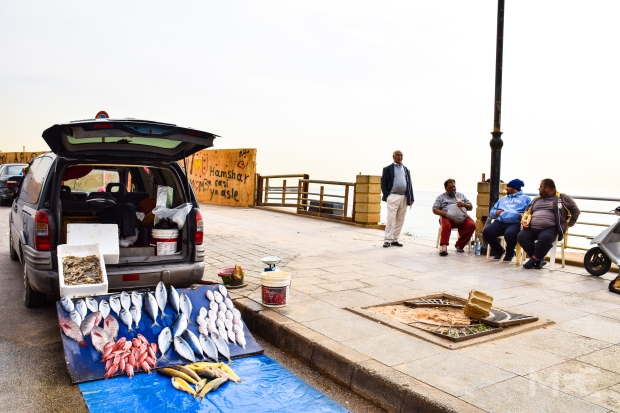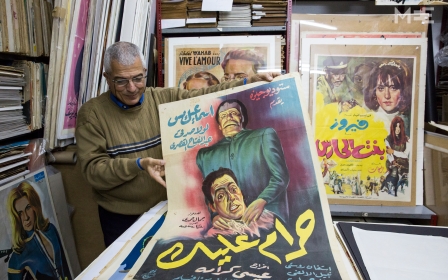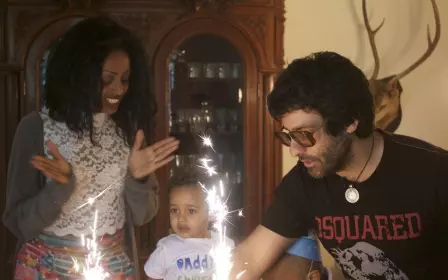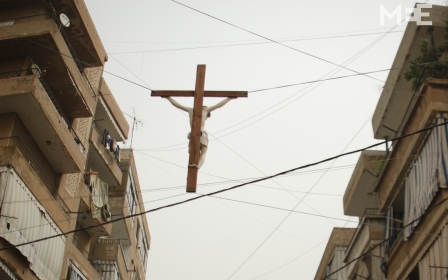Exiled hero of Beirut's suicide rock: 'I am the son of Raouche'
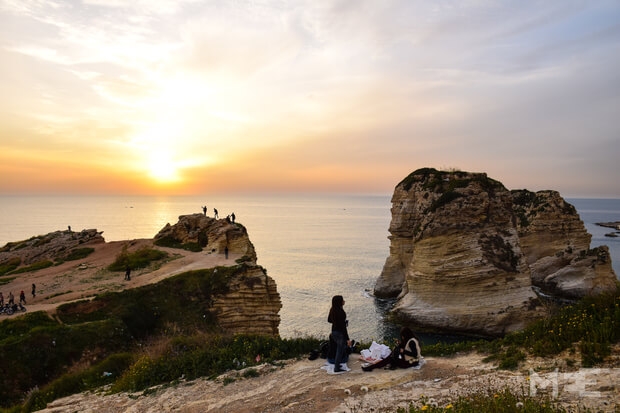
BEIRUT - Ali Itani was mending fishing nets when the screams reached his wooden hut. Outside, a crowd was gathering, trying to catch a glimpse of a man wrestling with the waves.
Without a second thought, Itani jumped off the cliff overlooking the Pigeon Rocks, also known as Raouche, two natural arches which have become symbols of the Lebanese capital. As he lifted the drowning man above the water, who clung to his neck and greeted him ecstatically: “Azra’il, angel of death!”
The two heaved and tossed with the rising tide, but all attempts to safely approach the rocky shore were to no avail. Seeing his father in difficulty, Itani’s youngest son Othman also braved the water to assist in the rescue.
Dwarfed by the enormous waves, Itani soon lost sight of his son. “I was conflicted, thinking whether I should leave the man to go look for Othman.”
Itani did not abandon the stranger though and Othman was pulled to safety by a cousin. Other family members threw down a rope, to which he held for what felt like hours before managing to drag himself and the drowning man ashore.
The 52-metre-high cliff overlooking Beirut’s Pigeon Rocks has long been a prime destination for Beirut’s desperate souls. This strip of sea has claimed the lives of star-crossed lovers, trauma-affected war survivors, poverty-stricken citizens, and overly curious visitors who lost their footing on the craggy cliff or were swept out to see by an unexpected wave while swimming.
Many of those who survived near misses are still alive and owe their lives to Ali Itani – known in the area as the "Hero of Raouche" – or one of his family members.
“I did it for God,” he says of his many rescues. “It is impossible for me to see people drown and stand there doing nothing.”
Of those he saved, many have come back to offer a reward, including the man he dragged out of the water that day. He offered Itani a bag containing five thousand dollars, a blanket and an engraved sword – an offer that Itani, despite his modest life as a fishermen, unhesitatingly turned down. “I wished him a long life but refused the gift. We are still in touch to the present day,” he says.
No place for heroes
Today, Ali Itani is a 50-year-old man with diabetes and an injured knee. His physique barely resembles the man who used to win the annual diving competition held in Raouche. But this isn't why the heroic legacy of his family might be coming to an end.
The area of Dalieh, as the locals call the terrain that slopes gently from the city to the sea, is now part of a project that aims to privatise the last public stronghold along Beirut’s coastline.
“The police came one morning at 5am, they hit me and told me that if I did not leave they would arrest me,” says Itani. Bulldozers razed his house and others belonging to his extended family, as well the little cafe on the shore and the boat he used to go fishing in. For decades, that same boat had also retrieved the bodies of those who could not be saved, so that their families could give them a dignified burial.
Almost one year since the displacement, debris and everyday objects are still scattered where the fishermen’s huts used to stand. “If they were smart, they would understand what we have done for the community and let us live there,” says Itani.
His nephew Mohammad still goes back to Raouche on a daily basis, enticing tourists to have a tour on his boat or selling beverages in a makeshift cafe made out of what was spared by the demolition.
Only a few days ago, they rescued a man who accidentally fell off the cliff. But the lives they rescue physically at sea are only a tiny fraction of the ones they have saved in total. “It is easy to recognise those who intend to commit suicide. They sit at the edge of the cliff looking gloomy and you can tell they are hesitating but on the verge of jumping,” says Mohammad.
“We approach them silently from behind, grab them by the shoulder and drag them away,” he adds.
After the eviction, Mohammad and his family had to rent a house in Shatila, a dreary Palestinian refugee camp in Beirut’s outskirts, to be able to afford a living.
For the first time in his life, Ali Itani also had to spend his nights away from the sea. He now scrapes a living by selling fish, sorrowfully displayed on the highway leading to Ramlet al-Baida, Beirut’s only public beach. This is far removed from his childhood days, when his family sold fish, vegetables and homemade cheese all produced along the grassy hills stretching from Ramlat el-Baida to Raouche.
“I rescued more people at sea than you can count the hair on your head,” says Itani. “What they [politicians] are doing [to the Itani community] is haram (an injustice).”
The Hariri plan for Dalieh
Well-connected investors have long been blamed by civil society for wiping out Lebanon’s natural coastline. The family of the deceased real estate tycoon and ex-prime minister Rafik Hariri has been behind many contested projects, including the reconstruction of Beirut’s souks as a high-end shopping venue following the end of the civil war.
Since Ottoman times, Dalieh had been owned by several Beiruti families. In the 1990s, the Hariri family bought the land and is today the main investor together with Bank Med – who did not respond to requests for comment.
Today, Beirut’s coastline is an uninterrupted sequence of concrete marinas and upscale beach resorts, unaffordable to the average Lebanese family. With natural pools emerging from its rocky shore, Dalieh is one of the very last spots where working-class Beirut families can swim and picnic.
According to Habib Battah, founder of Beirut Report and a long-time reporter on the developments in Dalieh, politicians have manipulated the laws to allow for major construction in once protected sea front areas. Reports unearthed by the newspaper Al Akhbar have detailed more than $1bn in unpaid fines and taxes, and at least 1,000 outright legal violations along Beirut’s coast.
“Why is the police deploying bulldozers to raze a few shacks while private resorts that contravene the law are still standing?” asks Battah. “What’s the law for if it is not equal for all?”
In the case of Dalieh, civil society has achieved an almost unprecedented result in opposing yet another development frenzy. Through weekly protests, university lectures and musical performances along the rock cliffs at Dalieh, the Civil Campaign to Protect the Dalieh of Raouche (CCPD) – formed in March 2013 - has managed to gain enough leverage to halt further construction.
“We are currently working to have Dalieh listed as a protected natural area or to have the Pigeon Rocks recognised as a monument. That would prevent further construction,” says Ghassan Maasri, a member of the CCPD.
Those who push for privatisation are attempting to decrease public access to the shore and increase the value of properties they already own. However, Maasri is confident that civil opposition, with the support of the Environment Ministry, will succeed in derailing the projects.
“We used to think there was nothing we could do to oppose those in power,” says Maasri, “but this grassroots movement has opened up a new perspective. We can do it.”
“In the end, the big fish eats the small fish,” says Itani with a grin, “but this land means too much to me to let it go. My father cultivated it with his own hands and my grandfather before him. I am the son of Raouche.”
New MEE newsletter: Jerusalem Dispatch
Sign up to get the latest insights and analysis on Israel-Palestine, alongside Turkey Unpacked and other MEE newsletters
Middle East Eye delivers independent and unrivalled coverage and analysis of the Middle East, North Africa and beyond. To learn more about republishing this content and the associated fees, please fill out this form. More about MEE can be found here.


